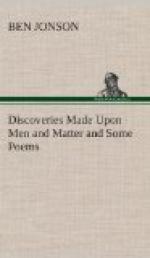Ingeniorum discrimina.—Not. 1.—In the difference of wits I have observed there are many notes; and it is a little maistry to know them, to discern what every nature, every disposition will bear; for before we sow our land we should plough it. There are no fewer forms of minds than of bodies amongst us. The variety is incredible, and therefore we must search. Some are fit to make divines, some poets, some lawyers, some physicians; some to be sent to the plough, and trades.
There is no doctrine will do good where nature is wanting. Some wits are swelling and high; others low and still; some hot and fiery; others cold and dull; one must have a bridle, the other a spur.
Not. 2.—There be some that are forward and bold; and these will do every little thing easily. I mean that is hard by and next them, which they will utter unretarded without any shamefastness. These never perform much, but quickly. They are what they are on the sudden; they show presently, like grain that, scattered on the top of the ground, shoots up, but takes no root; has a yellow blade, but the ear empty. They are wits of good promise at first, but there is an ingenistitium; {49a} they stand still at sixteen, they get no higher.
Not. 3.—You have others that labour only to ostentation; and are ever more busy about the colours and surface of a work than in the matter and foundation, for that is hid, the other is seen.
Not. 4.—Others that in composition are nothing but what is rough and broken. Quae per salebras, altaque saxa cadunt. {49b} And if it would come gently, they trouble it of purpose. They would not have it run without rubs, as if that style were more strong and manly that struck the ear with a kind of unevenness. These men err not by chance, but knowingly and willingly; they are like men that affect a fashion by themselves; have some singularity in a ruff cloak, or hat-band; or their beards specially cut to provoke beholders, and set a mark upon themselves. They would be reprehended while they are looked on. And this vice, one that is authority with the rest, loving, delivers over to them to be imitated; so that ofttimes the faults which be fell into the others seek for. This is the danger, when vice becomes a precedent.
Not. 5.—Others there are that have no composition at all; but a kind of tuning and rhyming fall in what they write. It runs and slides, and only makes a sound. Women’s poets they are called, as you have women’s tailors.
“They write a verse as smooth, as soft as cream, In which there is no torrent, nor scarce stream.”
You may sound these wits and find the depth of them with your middle finger. They are cream-bowl or but puddle-deep.
Not. 6.—Some that turn over all books, and are equally searching in all papers; that write out of what they presently find or meet, without choice. By which means it happens that what they have discredited and impugned in one week, they have before or after extolled the same in another. Such are all the essayists, even their master Montaigne. These, in all they write, confess still what books they have read last, and therein their own folly so much, that they bring it to the stake raw and undigested; not that the place did need it neither, but that they thought themselves furnished and would vent it




